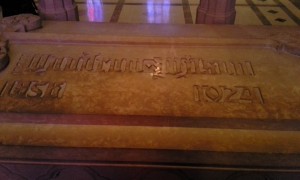Co-author Jerry Newcombe of Doubting Thomas? The Religious Life and Legacy of Thomas Jefferson (MorganJames, 2014)
Posted: 9/13/14
Through the years, I have served as a TV producer for D. James Kennedy Ministries (where I am still employed). I have covered so many stories related to discrimination against Christians because of the supposed separation of church and state. Our new book shows that the separation of the institution of the church from the institution of the state, properly understood, is a biblical concept and was promoted by some of our founding fathers, including Jefferson and Madison. However, today’s “separation of church and state” is often defined in such ways as to essentially mean “state-sanctioned atheism”—something none of the founders would countenance, including Jefferson. Groups like the ACLU actively promote the “state-sanctioned atheism” version of the separation of church and state.
And so, a few years ago, I interviewed an African-American woman who was kicked off a public bus in the pouring rain in the Pacific Northwest. Even though she was pregnant, she had to walk home in the driving rain. She said by the time she got home, she felt like a drowned rat. Why was she kicked off the bus? Because she was telling another passenger (who was interested) about her church. The bus driver said you can’t talk about God because it is city property. Get off the bus.
I remember another story where a girl got an F on a history paper she wrote in her public high school. Initially she had permission to write about Jesus of Nazareth, but then the teacher changed her mind and disallowed it—while permitting other students to write about subjects related to other religions or the occult. And this discrimination was done because of the supposed separation of church and state.
One time in the 1990s a judge in Texas said to a group of ministers sponsoring a baccalaureate service that if any of them prayed in the name of Jesus at that service, he would have them arrested, thrown in jail for a minimum of 6 months. The judge said, “You will wish you died as a child by the time this court gets through with you.” This is not what the founders intended—certainly not Thomas Jefferson or James Madison.
Suppose the worst report about Jefferson’s faith were true. What then? Well, then he would have missed heaven. That was his loss. Meanwhile, it’s still a fact that when he was a young man he did apparently believe in the Christian faith; and, as we’ll see, he articulated principles of religious freedom based on Jesus, “the holy author of our religion”—even if he later softened his stance on that point.
Furthermore, it’s critical to understand that even if he personally did not embrace Christ, His atoning death for sinners, His resurrection, the Trinity, the inspiration of the Bible, etc., a Judeo-Christian worldview provided the overall framework for Jefferson’s well-articulated ideas, which are predicated on a theistic worldview. (For example, we can’t have unalienable rights granted by a Creator, if there is no Creator.) From all the things attributed to Jefferson, you would think he was not a Christian, even in the most loose definition of one. The late atheistic journalist, Christopher Hitchens, makes these claims with little uproar, while a claim of Jefferson to be a Christian generates intense reactions. You would also think he lacked a Christian worldview. That touches on one of the most important points of this book. His views on religious freedom and on God-given rights grow out of the Christian tradition. Without Christianity, there would be no Jefferson, even if Jefferson himself rejected some tenets of the faith.
***New Entry: Posted: September 19, In the Year of our Lord 2014
The book (Doubting Thomas) contains NEW information that is not widely known….
For example, Thomas Jefferson helped start a church in 1777 (the Calvinistical Reformed Church of Charlottesville, VA) with the Rev. Charles Clay, an evangelical, as the minister.
The book contains two of the sermons of Rev. Clay—never ever before in print until this book. They are evangelical (and evangelistic) and Thomas Jefferson helped support this guy’s ministry. Thomas Jefferson even wrote up the agreement for the creation of this church.
This was a year after he wrote the Declaration and the same year as the Virginia Statute for Religious Freedom.
Later, Thomas Jefferson PRIVATELY shared with people growing doubts about the Trinity, the Divinity of Jesus, etc. But to take the Thomas Jefferson of 1813 (who denied the Trinity) and impose that on his writings of 1776 and 1777 (when he helped create a local orthodox church) is bad history. But that’s precisely what has been done.
Our book provides strong evidence, I believe, for two points: Thomas Jefferson was not a lifelong skeptic. Thomas Jefferson did not believe in the separation of God and state.
Yet in his name, we are constantly ripped away from our nation’s true heritage and our rights are being stripped away because of the strict “separation of church and state,” a reference he made in a private letter in 1802. In that very letter, if you want to get technical, Thomas Jefferson violated the separation of church and state by asking the recipients of the letter (the Danbury Baptists) to pray to God for him and he said he would pray for them. So the very letter that gave us the separation of church and state violates the separation of church and state—based on today’s twisted reading of that doctrine.
As president, Thomas Jefferson constantly attended Christian worship services that were held at the US Capitol. But what about the separation of church and state?, someone might ask. Again, Thomas Jefferson didn’t believe in the separation of God and state.
In short, the Thomas Jefferson of the ACLU is an historical fiction. Doubting Thomas seeks to set the record straight.
New blog—posted 9/25 in the Year of our Lord 2014
Regardless of how heterodox Thomas Jefferson’s personal religious beliefs may have become at the end of his life, regardless of where he ultimately chose to spend eternity, regardless of whether or not he was a true Christian, Jefferson helped make a great contribution to humanity in paving the way for greater religious freedom. In this effort, he received much aid from his friend and colleague, James Madison.
However, today’s secularists are taking the work of Jefferson and Madison and using it to strip away religious freedom from believers (and ultimately everyone else, too). Many Jewish leaders and thinkers like Rabbi Daniel Lapin warn that Jews in America will lose their rights soon after the Christians lose theirs. Secularists are misreading both Jefferson and Madison—not only in terms of their writings but their actions.
One of the great contributions of Thomas Jefferson to the world is this: He gave religious freedom a major boost in America. This helped religious freedom blossom elsewhere as well as what began in America spread to other places. The brave Chinese dissidents who challenged China’s tyrants in Tiananmen Square quoted Jefferson as they called for liberty in the land of Mao. The most important aspect of the religious liberty championed by Jefferson is that it is rooted in a Christian theological base, and that it extends to all regardless of their beliefs.
When Jefferson died, he listed his three most important accomplishments, as he saw them. Writing the Virginia Statute for Religious Freedom was one of the three. It’s no exaggeration to say that Thomas Jefferson has a lot to do with the religious freedom we enjoy today or that we have historically enjoyed.
The interesting thing about it is that the Statute appeared to appeal to Jesus Christ (“the holy author of our religion”) as the source of freedom. It said:
“Almighty God hath created the mind free . . . all attempts to influence it by temporal punishments . . . are a departure from the plan of the holy author of our religion, who being lord both of body and mind, yet choose not to propagate it by coercions on either, as was in his Almighty power to do, but to exalt it by its influence on reason alone. . . .”[1]
What this means is that the state is not to interfere with the conscience. Even God Himself leaves that up to the individual. In short, there is a theological (not secular) base for religious liberty.
[1] Bills Reported by the Committee of Revisors, 1779, [see bills 82-87], www.founders.archives.gov. Actually, Jefferson’s initial draft did not begin with a reference to God but opened as follows: “Well aware that the opinions and belief of men depend not on their own will, but follow involuntarily the evidence proposed in their minds. . . .” The General Assembly replaced this with the famous opening words it has today. But Jefferson never distanced himself from this modification.
—New post 9/30/14
The other day I worshiped Jesus in the National Cathedral. I don’t think Jefferson (author of the phrase “separation of church and state”) would have a problem with that. He regularly worshiped Jesus in the US Capitol building on Sunday mornings. Someone might say, “But what about the separation of church and state?” Well, the founders including Jefferson wanted to avoid establishing a national denomination, as they had in England, in France, in Germany, etc. No state-churches.
Our National Cathedral was opened in 1907. Think about it—having a “National Cathedral.” Hmmmm. Our 28th president (Woodrow Wilson) is buried there. I hadn’t known that until our visit. Bottom line: Jefferson’s view on church and state is far different than today’s view, which—as we point out in DOUBTING THOMAS—is often akin to “state sanctioned atheism.”
Pictured above is the sarcophagus of President Woodrow Wilson, who died in 1924. I hadn’t realized any president was buried in our National Cathedral, until I stumbled across his grave.
>>>New Blog, 10/20/14
We see the church in America under incredible attack, usually by those trying to force sexual anarchy on the country. In Houston, city officials have sent out subpoenas, demanding certain ministers who have spoken out against homosexuality to hand over their sermons and emails. In Idaho, a husband and wife team who run a wedding chapel might have to go to jail and be fined because they refuse for conscience sake to conduct same-sex weddings.
What’s happening today is in part because of a misreading of Jefferson. We try to set the record straight in Doubting Thomas.
In my work for D. James Kennedy Ministries, I have covered so many stories related to discrimination against Christians because of the supposed separation of church and state. The separation of the institution of the church from the institution of the state, properly understood, is a biblical concept and was promoted by some of our founding fathers, including Jefferson and Madison. However, today’s “separation of church and state” is often defined in such ways as to essentially mean “state-sanctioned atheism”—something different than what the founders advocated. Groups like the ACLU actively promote the “state-sanctioned atheism” version of the separation of church and state.
I remember when I interviewed an African-American woman who who was kicked off a public bus in the pouring rain in the Pacific Northwest. Even though she was pregnant, she had to walk home in the driving rain. She said by the time she got home, she felt like a drowned rat. Why was she kicked off the bus? Because she was telling another passenger (who was interested) about her church. The bus driver said you can’t talk about God because it is city property. Get off the bus.
I remember another story where a girl got an F on a history paper she wrote in her public high school. Initially she had permission to write about Jesus of Nazareth, but then the teacher changed her mind and disallowed it—while permitting other students to write about subjects related to other religions or the occult. And this discrimination was done because of the supposed separation of church and state.
One time in the 1990s a judge in Texas said to a group of ministers sponsoring a baccalaureate service that if any of them prayed in the name of Jesus at that service, he would have them arrested, thrown in jail for a minimum of 6 months. The judge said, “You will wish you died as a child by the time this court gets through with you.” This is not what the founders intended—certainly not Thomas Jefferson or James Madison.
Suppose the worst report about Jefferson’s faith were true. What then? Well, then he would have missed heaven. That was his loss. Meanwhile, it’s still seems that when he was a young man he did apparently believe in the Christian faith; and he articulated principles of religious freedom based on Jesus, “the holy author of our religion”.
—new blog. Written 10/28/14
Was Thomas Jefferson a Christian? Does it matter? In our book, we present the religious life of Jefferson as it developed chronologically. We believe some of his legacy has been distorted—so much so that some today, e.g., ACLU-types, want to use Jeffersonto strip away our nation’s Judeo-Christian roots. Jefferson wasn’t the only founding father. But Jefferson’s own legacy wasn’t as anti-Christian as some try to make it out to be today.
The problem as Gregg Frazer in The Religious Beliefs of America’s Founders identifies is that “The vast majority of those who have presented the religious beliefs of Adams, Jefferson, and Franklin in the past have done so selectively to advance an agenda or have simply accepted the labels traditionally applied to them.”[1] As a result, the story on Thomas Jefferson’s religious life has been written incorrectly.
To be sure, by the end of his life, Jefferson seemed to question some of the key doctrines of the Christian faith. But most commentators tend to ascribe these beliefs for all of his 65 adult years. In reality, Jefferson was a constantly developing and changing person of faith.
Jefferson is a man of contradictions. And it stretches all imagination to think of him as being in line with historic Christianity, certainly by the end of his life. But one part of his long life was not the same as other phases that are ignored by most modern commentators. But the real question is: Are the policies of today that are essentially fashioned in his name in line with what he himself would agree to? I think our book shows that they are not.
Jefferson did not view himself as an atheist nor a Deist; but he rather saw himself as one trying to save Christianity, as he understood it, from centuries of corruptions.
[1] Gregg Frazer, The Religious Beliefs of America’s Founders (Lawrence, Kansas: University Press of Kansas, 2012), 162.
Author Exclusive sale! Our website is the only place you can buy a copy and get it now (not pre-order!). Plus you can save over 25% here until it appears in stores in November.
$36 hardcover and $22 paperback (regular list prices: $50 and $30)
To order NOW: https://squareup.com/market/nationaltransformation-at-gmail-dot-com






